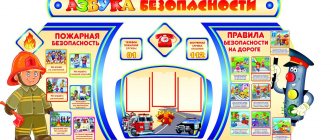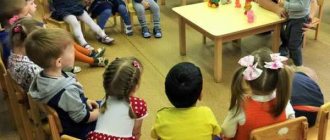Individual forms of work with parents.
The advantage of this form of work with parents is that through studying the specifics of the family, conversations with parents (with each individual), observing the communication of parents with children, both in a group and at home, teachers outline specific ways of joint interaction with the child.
Pedagogical conversations with parents. Providing timely assistance to parents on one or another issue of education. This is one of the most accessible forms of establishing communication with family. The conversation can be either an independent form or used in combination with others, for example, it can be included in a meeting or family visit.
The purpose of a pedagogical conversation is to exchange opinions on a particular issue; Its peculiarity is the active participation of both the teacher and parents. Conversations can arise spontaneously at the initiative of both parents and teachers. The latter thinks through what questions he will ask the parents, announces the topic and asks them to prepare questions to which they would like to receive an answer. When planning the topics of conversations, we must strive to cover, as far as possible, all aspects of education. As a result of the conversation, parents should gain new knowledge on the issues of teaching and raising a preschooler. In addition, conversations must meet certain requirements: • be specific and meaningful; • give parents new knowledge on issues of teaching and raising children; • awaken interest in pedagogical problems; • increase the sense of responsibility for raising children.
As a rule, the conversation begins with general questions; it is necessary to provide facts that positively characterize the child. It is recommended to think through in detail its beginning, on which success and progress depend. The conversation is individual and addressed to specific people. The teacher should select recommendations that are suitable for a given family and create an environment conducive to “pour out” the soul. For example, a teacher wants to find out the features of raising a child in a family. You can start this conversation with a positive description of the child, showing, even if insignificant, his successes and achievements. Then you can ask your parents how they managed to achieve positive results in their upbringing. Next, you can tactfully dwell on the problems of raising a child, which, in the teacher’s opinion, still need to be improved.
Family visit . The main purpose of the visit is to get to know the child and his loved ones in a familiar environment. By playing with a child, in a conversation with his loved ones, you can find out a lot of necessary information about the baby, his preferences and interests, etc.
The visit benefits both parents and the teacher: parents get an idea of how the teacher communicates with the child, have the opportunity in a familiar environment to ask questions that concern them regarding the upbringing of their child, and allows the teacher to get acquainted with the conditions in which the child lives, with the general atmosphere in the house, traditions and morals of the family. The teacher of each age group must visit the families of his pupils. Each visit has its own purpose.
The purpose of the first visit to the family is to find out the general conditions of family upbringing and to examine the child’s living conditions. Repeat visits are scheduled as needed.
When organizing a home visit, it is necessary to comply with the following conditions: • be tactful when visiting a family; • do not start a conversation in the family about the child’s shortcomings; • do not ask parents many questions about raising children; Make yourself a reminder about organizing home visits and try to follow it.
Individual consultations. Consultations are similar in nature to conversation. The difference is that a conversation is a dialogue between a teacher and a parent, and when conducting a consultation and answering parents’ questions, the teacher strives to give qualified advice. Individual notebooks, where the teacher records the children’s successes in different types of activities, parents can mark what interests them in raising their children.
These forms also include: • “Young Family School”; • execution of individual orders; • helpline; • Trust mail; • piggy bank of Good deeds, etc..
Individual forms of interaction with parents include:
1. An intimate conversation (can have a strong impact on parents, significantly change the attitude towards the teacher, the child, the concerns and affairs of the class. Parents are asked to think about what is important for teachers to take into account in raising their child, and prepare questions for the class teacher).
2. Execution of individual orders
3. Correspondence
4. Telephone conversation (it is necessary to agree on the terms of communication so that both parties do not have additional problems and inconveniences), etc.
The main goal of all forms and types of interaction between preschool educational institutions and families is to establish trusting relationships between children, parents and teachers, uniting them into one team, nurturing the need to share their problems with each other and solve them together.
8. Conditions for successful work of a preschool educational organization with a family.
The relationship between the preschool and the family should be based on cooperation and interaction, provided that the kindergarten is open inward and outward.
Partnerships with parents of students are relationships that will allow us to combine efforts to raise children and create an atmosphere of common interests.
A teacher who wants to establish constructive partnerships with parents must follow the principles:
1. Use positive communication skills. When communicating with parents, you need to ask and listen more than pointing or giving them advice. Parents should be frequently informed, both orally and in writing, about their child's progress and achievements, and individualized forms of sending information to and receiving information from families should be used. Before communicating to parents the goals and objectives of the educational program, you need to find out what they want, and also respond to parents' suggestions, ideas and requests in a timely and positive manner.
2. Providing family members with the opportunity to make choices and decisions. The educator helps family members summarize what they want for their children and for themselves. When planning and providing services, parents should be treated as the true experts on issues related to their children. The teacher gives parents the right to choose when, where and how they will participate in their child’s education.
3. Identifying and using the positive traits and strengths of the child and family. Parents should be informed about the child's strengths, accomplishments, and positive character traits through interviews, telephone conversations, notes, etc. Educators obtain information from parents about long-term goals, hopes, and aspirations for the future of their child and family; recognizes and expresses gratitude to parents for their unique contributions to their child's progress.
4. Respect for the diversity and uniqueness of families. It is necessary to accept and respect the opinions and feelings of parents, even if they do not coincide with our own, and try to develop an understanding of the cultural values of the families with whom we work.
5. Creating a friendly partnership between the kindergarten and the family. The teacher provides all family members with the opportunity to actively participate in group activities and does everything to make parents feel comfortable. Parents should be given the opportunity to participate in decisions regarding group activities.
At the present stage, partnership interaction between teachers and parents of preschool children is carried out mainly through:
— involving parents in the pedagogical process;
— expanding the scope of parental participation in organizing the life of an educational institution;
- parents attending classes at a time convenient for them;
— creating conditions for creative self-realization of teachers, parents, children;
- information and pedagogical materials, exhibitions of children's works, which allow parents to become more familiar with the specifics of the institution, introduce them to the educational and developmental environment;
— various programs for joint activities of children and parents;
- combining the efforts of a teacher and a parent in joint activities for the upbringing and development of a child: these relationships should be considered as the art of dialogue between adults and a specific child based on knowledge of the mental characteristics of his age, taking into account the interests, abilities and previous experience of the child;
- manifestation of understanding, tolerance and tact in raising and teaching a child, the desire to take into account his interests, without ignoring feelings and emotions;
— respectful relationship between family and educational institution. If educators want to encourage successful parent involvement, they need to establish active, ongoing, flexible, and positive communication with parents.
9. Creation of a unified educational space “Pre-Family”.
Refusal to use the unique experience of family education in the pedagogical process of kindergarten, rejection of the family and, as a consequence, passivity of parents leads to an impoverishment of the content of education.
A positive result can only be achieved when considering the family and kindergarten within a single educational space, implying interaction and cooperation between preschool teachers and parents throughout the child’s preschool childhood.
The most important feature of a unified educational space and at the same time a condition for its creation is the definition and acceptance by participants of the pedagogical process of common goals and objectives of educating preschoolers, which are formed in a unified program for the upbringing, training and development of children.
Modern education programs for preschoolers are built on the basis of the Concept of Preschool Education, achievements of psychology and pedagogy. However, parents who act as social customers of educational services often do not have in-depth knowledge in this area.
Therefore, the goal and objectives of public education should be the subject of detailed discussion by teachers and parents, during which the teacher needs to convey to the family his vision of the result of raising a child and reconcile it with the pedagogical attitudes of the parents.
The next sign and condition for creating a unified development space should be the development and acceptance of uniform requirements for the child at home and in preschool educational institutions. This helps not only to create psychological comfort for the child, but also to strengthen the authority of parents and teachers. An equally important feature and condition for creating a unified educational space is the development of a common approach to solving problems of education, the identification, generalization and coordination of pedagogical methods and techniques based on the study of the educational experience of the family and the transfer of information to parents about the technologies of the educational process.
Thus, modernity poses quite complex tasks for preschool educational institutions and places high demands on the professionalism of teachers.
Conditions of a single space of a preschool educational institution - family.
The federal educational standard for preschool education is aimed at solving the problem of providing psychological and pedagogical support for the family and increasing the competence of parents (legal representatives) in matters of development and education, protection and promotion of children's health. The content section of the educational program of preschool education should present the features of interaction between the teaching staff and the families of students. In the educational environment of the kindergarten, conditions must be created for the participation of parents in educational activities.
The kindergarten has developed its own system of interaction with the parents of pupils. In accordance with the results of the study of the parent contingent, work is carried out in the following areas:
— analysis of the level of psychological and pedagogical culture of parents (questioning, sociometry method, observations and analysis of the child’s interaction with parents).
— popularization of modern psychological and pedagogical ideas, providing parents with the necessary theoretical and practical information (open days, parent meetings (group, general, conference at the end of the school year, various forms of visual information in the corner for parents: booklets, recommendations, consultations, mailbox for questions, “repeat with the child”, “cook for the child”, “make with the child”, etc.) For children who do not attend preschool institutions, a short-term group for children aged 2-3 years is organized. Classes are held 3 times a week for two hours the entire school year.Narrow specialists work with children and parents: educational psychologist, music director, physical education instructor, speech therapist.
- the use of non-traditional forms of work with families of pupils - family meetings: master classes on making a product of artistic and aesthetic activity, training games “When you were little”, creation of joint projects “Space”, “Household Appliances”, “Cook”, “ Seller”, “Pets”, “Computer”, “How to build a house” and others, holidays “Russian song - Russian soul”, “Family Day”, “Olympiad”, “Defenders of the Fatherland”, “Health Day”, “Tasting dishes."
— bringing to parents interesting and useful information related to the life of children in kindergarten: advice from experts, a music and poetry corner; corner “Neboleyka”, exhibition “Do it with the children”, photo exhibition “The world around me”, Rainbow of success, “Today we did ...”, “We sincerely thank you”, “In the family circle”, Children’s creativity corner, “We live and live” .
— individual focus in working with parents (differentiated consideration of educational influences in a family environment, inclusion of parents in the pedagogical process, taking into account their individual interests and abilities);
— involving parents in the management of the kindergarten through participation in the work of the Conference, the parent committee, and the Council of Teachers.
The importance of individual consultations for parents and the specifics of their implementation
Maria Moskina
The importance of individual consultations for parents and the specifics of their implementation
The Federal State Educational Standard for Education says that an individual approach is necessary not only when working with children, but also when working with parents . The teacher, when communicating with parents , must feel the situation, the mood of mom or dad. This is where the teacher’s human and pedagogical ability to reassure the parent , sympathize and think together about how to help the child in a given situation comes in handy.
One of the forms of work that helps to implement an individual approach both in working with a child and his family is individual counseling . Part of the consultation is devoted to children's learning difficulties. Individual consultations are close to conversations , their main difference is that the latter involve dialogue, which is led by the organizer of the conversations. The teacher strives to give parents qualified advice and teach something. This form helps to get to know the life of a family more closely and provide help where it is needed most; it encourages parents to take a serious look at their children and think about how to more effectively teach and raise their children.
Individual consultation helps parents and teachers make the overall correct solution to a particular problem that has arisen so as not to harm the child.
For many parents, individual consultation helps them open up . Parents , listening to the teacher, begin to understand the problematic situation as it really looks, and not as they see it from their side.
Preparing for consultation :
- outline a topic, plan;
— prepare content, visibility;
- think about the place and time;
- invite the parent ;
— formulate recommendations.
When preparing for a consultation , it is advisable to identify a number of questions, the answers to which will help plan educational work with the group. Individual consultation should be informational in nature and contribute to the creation of good contact between parents and teacher . The teacher must give parents the opportunity to tell him everything that they would like to introduce the teacher to in an informal setting, and find out important information for their professional work with the child: the child’s health characteristics , his hobbies, interests, preferences in communication in the family, behavioral reactions, character traits , learning motivations, family moral values.
Contents of the consultation .
The consultation can be organized in the form of a conversation, discussion of a problem, an article (read in advance, questions and answers. The content of the consultation consists of an introduction, the main part and a conclusion. The content is specified in detail.
Requirements for consultation .
-Consultation is carried out in the evening and in the absence of the child.
-The consultation is carried out without haste and in a friendly manner.
-It is important to win over the parent .
-The consultation is initiated by the preschool educational institution , but can be carried out at the request of the parent .
When inviting parents for an individual consultation, you need to behave correctly. Always smile. A smile is a small key to positive emotions and easy communication. Be sure to address your parents by name and patronymic. Always know how to listen and hear, listen without interrupting. Look at the problem that has arisen through the eyes of the parents , and not just with your own eyes, then you can see which side is better to approach this problem, how to correctly present its solution without damage to the child and his parents .
Emotions play a big role in . Parents may be constrained, or, on the contrary, impulsive. The teacher must find a special approach for an individual consultation to take place . It is necessary to choose the intonation of your voice, be attentive, and polite. When talking, look at your parents and not to the side. The relationship must be trusting. Under these conditions, individual consultation brings great benefits when working with parents .
Thus, we came to the following conclusion: working with parents is a complex and important part of a teacher’s activity. Individual consultations are a form of teacher work with parents of preschool children. The purpose of the consultations is to increase the pedagogical literacy of parents on the issues of raising and educating the child, solving problematic issues, enhancing the pedagogical skills of parents , helping parents in resolving difficult pedagogical situations, informing about the successes and achievements of the child. Emotions play a big role in . Therefore, the teacher must be able to find a special approach to each parent in order for an individual consultation to take place .
Article on the topic “Organizing and conducting a conversation with parents”
Organizing a conversation with parents
The purpose of a pedagogical conversation is to exchange opinions on a particular issue of education and achieve a common point of view on these issues, providing parents with timely assistance.
A conversation can be used in working with parents as an independent form and in combination with other forms: a conversation when visiting a family, at a parent meeting, consultation.
Features of the conversations:
- The leading role here is given to the teacher; he plans the topic and structure of the conversation in advance.
- The active participation of both the teacher and parents in the conversation is an essential feature of this form, which allows for an effective influence on parents.
Sometimes a teacher, having given parents advice, made an instruction, a remark, believes that he has talked with the parents. But at the same time, it remained unclear what the parents themselves thought about this: how they perceived the advice, remark, how they plan to follow the teacher’s recommendations, what, in the opinion of the father or mother, was the cause of deviations in the child’s behavior, what makes it difficult for them when raising this or that skill, ability, quality, etc., i.e. there was no substantive conversation.
The conversation is best conducted in order to prevent conflict situations, to establish relationships between parents and children, between individual teachers and the family.
It is necessary to use conversation when working with parents in order to achieve a trusting atmosphere and identify difficult points of contact in conflict situations. The results of the conversation should not become public if one of its participants does not want it
.
In a conversation, the teacher should listen and hear more, and not give educational recommendations or edify.
- When conducting a conversation, it is recommended to choose the most appropriate conditions and start it with neutral questions, then move directly to the main topics.
- If the conversation arose spontaneously (usually in this case, it is initiated by the parents) and the teacher cannot give the father or mother the necessary attention, he arranges a special meeting with the parents at a time convenient for them.
Other parents may be invited to this conversation, for whom, in the opinion of the teacher, participation in a conversation on this topic is useful.
But it is necessary to take into account: if the issues raised in the conversation are related to intra-family relationships, the presence of strangers is undesirable - the atmosphere of the conversation should be conducive to frankness. And in the case when the conversation arises on the initiative of the parents, caused by their questions, judgments, proposals, the teacher should take charge of the conversation: he gives it the right direction, draws conclusions. - If the initiator of the conversation is a teacher, he thinks in advance where he will start it, what questions he will ask parents in order to reveal their understanding of the issues under discussion and their attitude towards them.
When agreeing with parents on the time of the conversation, the teacher informs the topic and asks them to prepare questions to which they would like to receive an answer. When planning the topics of conversations, it is necessary to strive, if possible, to cover all the problematic aspects of raising children.
Pedagogical conversation must meet certain
requirements:
- first of all, this is their specificity and content;
as a result of the conversation, parents should receive new knowledge on the issues of teaching and raising children - the conversation should awaken parents’ interest in pedagogical problems and increase their sense of responsibility for raising children.
- What is important is the lively nature of the conversation, goodwill, but the friendly tone in which the conversation is conducted does not exclude the teacher from presenting the necessary demands.
In order to achieve contact with parents during the conversation and involve them in the discussion, the teacher must provide a number of conditions:
- Consider the place and time of the conversation.
- Parents should have enough time to discuss the planned issues without rushing.
- During the conversation, nothing should distract those talking.
There should be no strangers whose presence may embarrass parents, although there are cases when the teacher deliberately seeks to attract the attention of other parents and involve them in conversation.
- It is better to start the conversation with more general, neutral questions.
- The teacher always has facts that positively characterize the child.
These facts must definitely be applied in conversations, then the negative things that the teacher is forced to say about the child are not perceived so painfully by the parents.
Of course, in subsequent conversations, the teacher must find out how his advice was implemented by the parents, and what has changed in the child’s upbringing.
When using a conversation as a means of obtaining information about a child’s upbringing in a family, the teacher must keep in mind that this information is not always sufficiently reliable. The fact is that people’s actual behavior and their own assessment of this behavior may not coincide and even come into conflict, especially when assessing family relationships. Therefore, knowledge about the nature of raising a child in a family, obtained in a conversation, should be supplemented and clarified when the teacher visits the family, his observations of the relationship between parents and child.
Material for conversations with parents is given to the teacher by observing the child: his compliance with the rules of behavior in a team, his attitude towards children, adults and their demands, his attitude towards activities; conversations with the child, revealing his knowledge, ideas, motives of behavior.
The friendliness of the teacher, the validity of his assessments and the conclusions he makes from the perspective of the child’s interests, make parents want to openly express their opinions, share impressions, and talk about the child’s behavior in the family. Basic rules for establishing good personal contact and building effective communication and interaction with parents.
Basic requirements for conducting a conversation:
Preparation for the conversation:
- Determine the purpose of the conversation.
Otherwise the conversation is a fruitless conversation. The true goals of the conversation should not be known to the interlocutor.
- Determine the target questions you will ask
.
Rank the questions in order of importance. Create a conversation plan based on your specific situation.
- Identify questions that support the conversation.
Based on the needs and interests of the interlocutor.
Making contact with the interlocutor.
- Questions to keep the conversation going. Ask questions that interest your interlocutor in order to interest him
- Do not start with questions that cause negative feelings in the interlocutor. If you see the passivity of your interlocutor: you started with a bad question, he is not in the mood, took the wrong tone, hit a sore spot - try to correct the mistake immediately - be actively and attentive.
How to conduct a conversation correctly.
- How to ask questions better
Do not ask questions “head-on” (it is better to ask them in an indirect form). Questions should be short and understandable to the interlocutor
- Listen carefully and confidentially. Show this to your interlocutor with your gaze, facial expressions, gestures, and with your whole body tilted towards the interlocutor. By sympathizing, approving and supporting, you can hear the maximum amount of information
- Give your interlocutor an opportunity to speak. Don't rush him. Approve the accuracy of the thoughts expressed. Ask counter questions to help you speak up or to validate the accuracy of your thoughts.
- Do not interrupt the interlocutor's statements. The interlocutor always talks about things that are significant to him. Remember! When a conversation is interrupted, contact is lost and important information may be lost. Basic moments:
- Give the other person a chance to talk
- Express your interest using supportive expressions (“Did I understand correctly?”, “Did I mix up anything?”, “Do you think that...”, etc.)
- Summarize the most important statements
- Don't interrupt the other person
- Don't contradict
- Ask questions
Thus, conversation is a means of establishing contacts with parents, studying the child’s family upbringing and influencing the nature of this upbringing.
Thematic meetings at preschool educational institutions
Borisova Victoria
Thematic meetings at preschool educational institutions
Thematic meetings are one of the interactive forms of interaction with parents, which is aimed at cooperation between families and preschool educational institutions in solving problems of education and upbringing of children in various educational areas, increasing the role and responsibility of parents in civic education and raising a child.
Methodology of organization and implementation.
A week before the announced meeting with parents, it is necessary to post an announcement that would detail the topic and form of the meeting, and also indicate the date, time and location of the meeting.
Information about the upcoming meeting must be known in advance; in order to set up parents for dialogue, it is necessary to hang up a stand on which the main issues that will be considered at the meeting with parents and preschool employees will be presented in a colorful form.
It is important to invite parents to the meeting , taking into account their work schedule. It is necessary to determine how much time should be required to hold a meeting, how to properly arrange the tables in the room in which the meeting . To attract the attention of parents to the importance and necessity of individual items, meetings can be held in music rooms, a methodological room, a gym, an art or environmental studio. the meeting in the room , parents begin to perceive these rooms through the eyes of their children, understanding their significance in organizing the pedagogical process.
During the meeting with parents, the administration of the preschool institution must take into account the presence of children who will be in the room with their parents until the end of the meeting . Therefore, it is necessary to organize the employment of children during the meeting and, if necessary, provide them with food during the meeting .
In the room where children are, it is necessary to think about where to organize a temporary locker room for parents, asking them in advance to take replacement shoes.
Throughout the meeting with parents, it is necessary to observe the laws of dialogue, according to which it is important not to violate the rights of parents to feedback, not to forget about time and to end the meeting at the exact time, respecting the time of not only parents, but also your fellow teachers. If some issues were not covered the meeting thematic meeting .
Sample topics for thematic meetings in different age groups.
Junior group: about the skills of confidential communication with a child in the family; the child’s peace of mind is associated with the style of family relationships;
Middle group: about non-violent methods of influencing a child or how to “save yourself”
playing when I'm angry with my child; how to listen to a child in order to hear him; animals in the house;
Senior group: how to speak to a child correctly; how not to devalue the experiences and events of a child’s life; what is your child like in terms of friendship with peers;
Preparatory group: family well-being on the threshold of the child’s school life; about the realistic expectations of parents from a future first-grader; why play school with your child;




